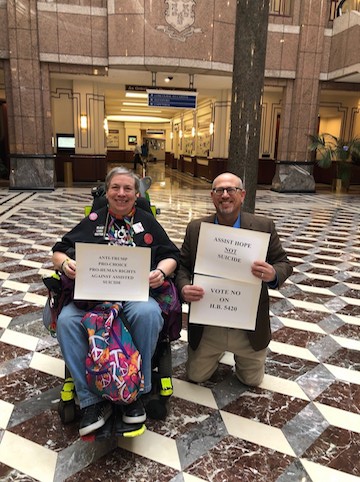“Momentum,” They Claimed
The 2024 legislative session in Connecticut is well underway. The scope of threats to life, faith, and family that may come out of the short session remains to be seen — but on one hot issue, we may have already won.
Last Friday was the deadline for either of two key committees, Public Health or Judiciary, to raise an Assisted Suicide bill for a public hearing. Neither committee raised the bill. In fact, for the first time in eight years, there was no proposed assisted suicide bill at all.
As a result, it is now extremely unlikely we will have any assisted suicide bill come up during this session. That makes 2024 the first time in seven years that there will be no public hearing on assisted suicide.
It was a long haul to get to this point. For three years in a row (2013-15), FIC and our allies beat assisted suicide, each year more decisively than the year before. When the issue returned in 2018, we beat it again–and for the next two years afterward.

But during the pandemic years of 2021-22, when our disability rights allies were locked out of the Legislative Office Building, assisted suicide advanced out of the Public Health Committee before dying elsewhere. By the time we could testify in person again in 2023, the Public Health Committee had been stacked with pro-assisted suicide legislators.
So it was that 2024 began with the claim that, as one media outlet put it, “Despite the short session this year, there is momentum among proponents to revive the[assisted suicide]issue.”
Two developments aided this claim. One was a much-publicized walk across Connecticut to promote the legalization of assisted suicide by its lead lobbyist. The other was the also-much-publicized assisted suicide of a Connecticut activist in Vermont.
That is why, already by January 9th, the Hartford Courant was writing its “Aid-in-dying debate likely to reignite in Connecticut in 2024” headline.
How is it, then, that we seem to have already defeated assisted suicide in 2024?
First, pro-assisted suicide Rep. Josh Elliott let the cat out of the bag. In a Jan. 4th interview Elliott openly admitted that the purpose of passing a “restrictive” assisted suicide law was so that the assisted suicide lobby could then come back and expand it. By saying the quiet part out loud, Elliott was confirming that our fears were correct all along.
Second, it was revealed that the journalists who covered the assisted suicide of Connecticut activist Lynda Bluestein were the ones who signed the paperwork attesting to her state of mind, even though they barely knew her. Instead of becoming a poignant example of why assisted suicide should be legalized, Bluestein’s death became Exhibit A for why assisted suicide should never be legalized.
Third, pro-assisted suicide legislators on the Public Health Committee pursued the unprecedented idea of holding a “joint” public hearing on assisted suicide with the Judiciary Committee by telling the media they wanted such a hearing–but not bothering to tell Judiciary Committee co-chairman Rep. Steve Stafstrom they wanted such a hearing. The idea quickly went nowhere.
We do not mean to suggest that assisted suicide only failed in 2024 because of the many errors of its supporters. At the end of the day, Connecticut has been protected from assisted suicide for over a decade because of the incredible coalition of which FIC is a part.
Behind that coalition success were many individual members who testified, attended public hearings, wrote op-eds, came to lobby days, shared our information, and more. Those efforts mattered tremendously.
No Public Hearing At All = Assisted Suicide’s Biggest Defeat In Years
This is great news, but we can’t let our guard down yet. We are never 100% out of the woods until the session ends. Though it is extremely unlikely, assisted suicide could be brought up through a different, less standard avenue.
If that happens, we are prepared to mobilize again and to win. We are not satisfied only to crush the suicide lobby in public hearings — we want them to pull up their stakes and go away for good.
This victory — like everything we do — is made possible through Providence and the dedication of our members.


















